We all have drama in our lives, from family drama to workplace to spousal and relationship drama. Most of the time, we allow this drama by engaging and enabling dramatic people and situations. I have realized that to have peace of mind, you need to reduce drama and dramatics to the bearest minimum. We stay in familiar relationships with no-growth individuals and constantly nag about the negativity, toxicity and drama we have to deal with constantly. Saying No to drama can be tough, especially with family and friends, but you have to make the tough decision of reducing the amount of time you spend with dramatic people.
We stay stuck in a drama triangle and become helpless and miserable due to our interactions with harmful, toxic, dramatic individuals. It is not a great place to be, as setting boundaries for family and friends can be extremely tough. As Robert Frost noted in his 1914 poem “Mending Walls,” – ‘Good fences make good neighbours.’ Boundaries without consequences is nagging. We constantly complain and nag about people’s dramatics, but we do nothing about it. You need to protect your peace of mind as life is too short to be spending it with people that are not elevating you. Say NO to Drama.
Good fences make good neighbours.
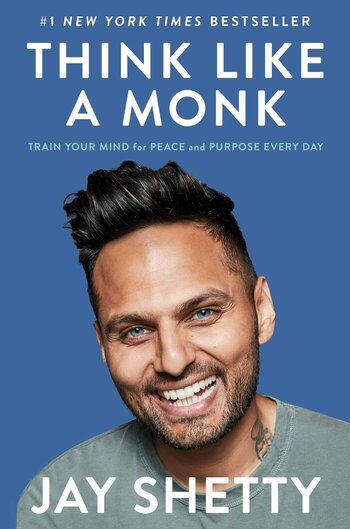
In Think Like a Monk: Train Your Mind for Peace and Purpose Every Day 1, former monk and author Jay Shetty describe the various types of negative people:
- Complainers, like the friend on the phone who complain endlessly without looking for solutions. Life is a problem that will be hard, if not impossible, to solve.
- Cancellers, who take a compliment and spin it: “You look good today” becomes “You mean I looked bad yesterday?
- Casualties, who think the world is against them and blame their problems on others.
- Critics, who judge others for either having a different opinion or not having one, for any choices they’ve made that are different from what the critic would have done.
- Commanders, who realize their own limits but pressure others to succeed. They’ll say, “You never have time for me,” even though they’re busy as well.
- Competitors, who compare themselves to others, controlling and manipulating to make themselves or their choices look better. They are in so much pain that they want to bring others down. Often we have to play down our successes around these people because we know they can’t appreciate them.
- Controllers, who monitor and try to direct how their friends or partners spend time, and with whom, and what choices they make.
The Karpman Drama Triangle 2
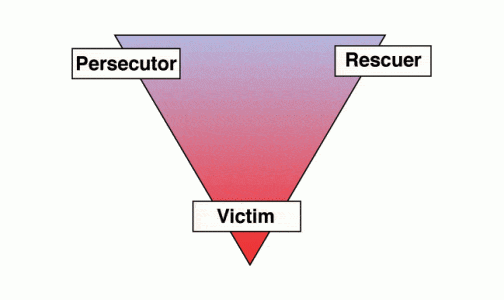
The Karpman drama triangle was developed by psychiatrist and Transactional Analysis teacher Dr. Stephen B. Karpma. The Drama Triangle is a model of human interaction that maps a type of destructive interaction that can occur among people in conflict. The triangle of actors in the drama are persecutors, victims, and rescuers.
“No matter where we may start out on the triangle, victim is where we end up, therefore no matter what role we’re in on the triangle, we’re in victimhood. If we’re on the triangle we’re living as victims, plain and simple!”
The three aspects, or faces in the drama triangle:
- The Victim: The Victim in this model is not intended to represent an actual victim, but rather someone feeling or acting like one. The Victim’s stance is “Poor me!” The Victim feels victimized, oppressed, helpless, hopeless, powerless, ashamed, and seems unable to make decisions, solve problems, take pleasure in life, or achieve insight.
- The Rescuer: The rescuer’s line is “Let me help you.” A classic enabler, the Rescuer feels guilty if they don’t go to the rescue. Yet their rescuing has negative effects: It keeps the Victim dependent and doesn’t allow the Victim permission to fail and experience the consequences of their choices.
- The Persecutor: The rescuer’s line is “It’s all your fault.” The Persecutor is controlling, blaming, critical, oppressive, angry, authoritarian, rigid, and superior.
These roles keep getting played out over and over. However, the problem with this Drama Triangle is that whenever anyone gets uncomfortable in their role, they only have either of the other two roles to choose from.
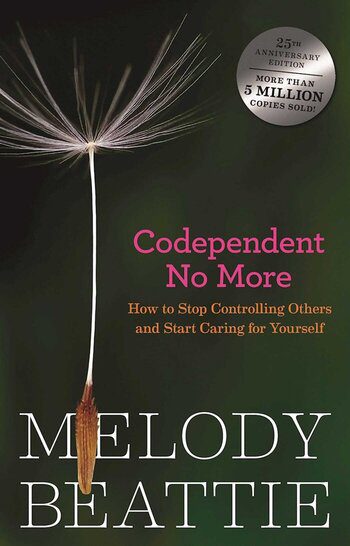
In Codependent No More: How to Stop Controlling Others and Start Caring for Yourself 3, author Melody Beatty observed:
We rescue people from their responsibilities. We take care of people’s responsibilities for them. Later we get mad at them for what we’ve done. Then we feel used and sorry for ourselves. That is the pattern, the triangle.
Caretaking doesn’t help; it causes problems. When we take care of people and do things we don’t want to do, we ignore personal needs, wants, and feelings. We put ourselves aside. Sometimes, we get so busy taking care of people that we put our entire lives on hold.
Rescuing leaves us bewildered and befuddled every time. It’s a self-destructive reaction, another way codependents attach themselves to people and become detached from themselves. It’s another way we attempt to control, but instead, become controlled by people. Caretaking is an unhealthy parent-child relationship—sometimes between two consenting adults, sometimes between an adult and a child.
Caretaking breeds anger. Caretakers become angry parents, angry friends, angry lovers. We may become unsatisfied, frustrated, and confused Christians. The people we help either are or they become helpless, angry victims. Caretakers become victims.
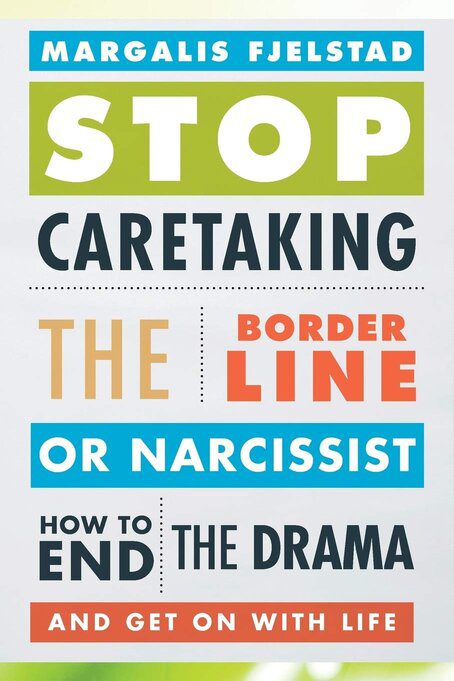
In her book, Stop Caretaking the Borderline or Narcissist: How to End the Drama and Get On with Life 4, Marriage and Family Therapist Margalis Fjelstad advised using the caring triangle instead of staying stuck in the drama triangle. She writes
Instead of the actions of the persecutor, you take on the new behaviors of doing and assertion. You give up trying to force others to do what you want and blaming them for what you don’t like, and you take actions that you decide on. You ask for what you want, you act on your own behalf, and you take positive action. Instead of the victim role, you accept the situation you are in and take responsibility and make choices to function in a more healthy and happy way. You put real thought into what you want and how to get it, and you take action to make things change.
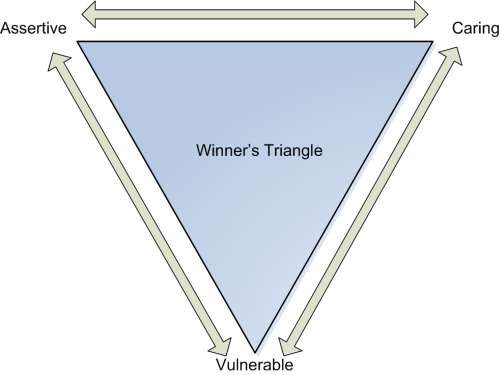
Instead of being the rescuer, you give the BP/NP the respect of letting him or her take care of solving his or her own problems, dealing with his or her feelings, and choosing his or her own solutions. You can refuse to take what the BP/NP says and does as meaning anything about who you are. You can quit letting fear, obligation, and guilt control and manipulate you into taking care of the BP/NP when you really don’t want to. Your attitude makes a huge difference in getting out of the Drama Triangle.
Even though we may view our rescuing in a positive or heroic light, it is actually accomplishing the opposite. It is protecting the rescued individual from facing their own fears, pains, and failures—the very things that tend to launch true healing and progress. When we insulate someone else from the consequences of their own behavior, we are denying them the chance to grow and learn. – Whole Again, Jackson MacKenzie
Meditation
- Daily Calm with Tamara Levitt – Gorillas
- Often times when we approach a certain situation where uncertainty is high, we are, so to speak armed without even realizing it – our shields are up, our mind is closed and we are projecting an air of defensiveness perhaps even hostility and people can sense our hostility, they put on their own shields too.
- The result is usually different when we approach people from a place of openness. If we are patient, compassionate and understanding, people pickup on those qualities and they relax and open up.
“Speak to people with love and compassion and you have the ability to create change in them.” – Matt Valentine
Daily Jay with Jay Shetty – Obstacles Makes Us Stronger
The mind adapts and converts to its own purposes the obstacle to our acting. The impediment to action advances action. What stands in the way becomes the way. – Marcus Aurelius
- The obstacles we have is an opportunity for growth, improvement, creativity and perspective.
- The Lew Alcindor Rule – NCAA banned dunking for ten years to stop Kareem Abdul-Jabbar! The rule could have stopped Kareem in his tracks, but instead, he met his obstacles and modified his approach, he pivoted, and in doing so, he even got better and more dangerous. He created an unblockable shot; he shattered records and held them for decades.
- When something stands between us and our goals, it can feel really daunting; it can really threaten to derail us but it is vital to stay flexible and adapt to an ever-changing world.
- Business Pivots – Twitter started out as a network to find and subscribe to podcasts but when Apple got into the game, Twitter executives didn’t think they stood a fighting chance, so they pivoted – they built one of the most influential social media platforms on the internet.
- Live is filled with obstacles big and small; time and again, you will be filled with impediments to your goals, growth and happiness. In those moments, you would have a choice: Succumb to them and give up, or you can pivot and move forward.
- You can’t change reality for every obstacle you face, but you can change your reaction to it. You can control whether you let it stop you or use it as an opportunity to adapt and grow. It is natural to get frustrated, get angry; it is ok to let yourself experience those emotions but don’t let them guide you, they would simply slow you down instead when trying to figure out what to do next, just remember that what stands in the way becomes the way.
Podcast
- X-Factor For Success | THE ED MYLETT SHOW
- The most powerful force on earth is to be consistent and congruent with the expectations of our peer group. We become the expectations of our peer groups.
- Proximity is power; the closer someone is to you, the more power they have over you.
- We get our standards in life. Standards dictate everything in life, and the people around us help create those standards based on their standards.
Jason Derulo On SELF-MASTERY, Success & Unleashing Your CREATIVE GENIUS | Lewis Howes
- Until you see yourself as a brand, you are totally selling yourself short.
- Success is never owned; it is rented. There is always someone hungrier, younger, talented and more driven than you are.
Success is for Rent, and You would never pay it off.
All the best in your quest to get better. Don’t Settle: Live with Passion.


Comments are closed.